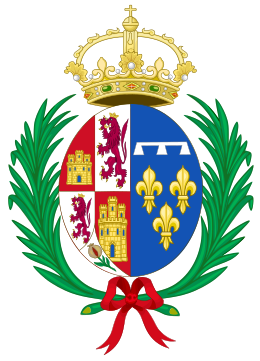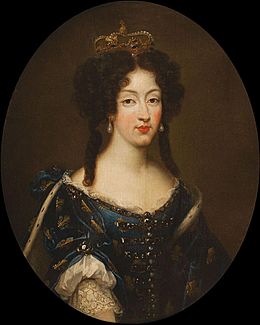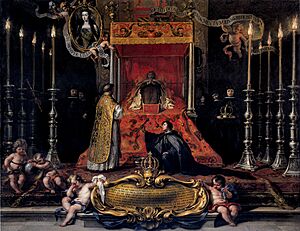Marie Louise d'Orléans facts for kids
Quick facts for kids Marie Louise d'Orléans |
|||||
|---|---|---|---|---|---|
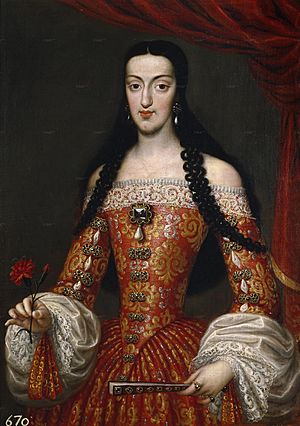
Portrait by José García Hidalgo, c. 1679
|
|||||
| Queen consort of Spain | |||||
| Tenure | 19 November 1679 – 12 February 1689 | ||||
| Born | 26 March 1662 Palais Royal, Paris, France |
||||
| Died | 12 February 1689 (aged 26) Royal Alcázar, Madrid, Spain |
||||
| Burial | El Escorial | ||||
| Spouse | |||||
|
|||||
| House | Orléans | ||||
| Father | Philippe I, Duke of Orléans | ||||
| Mother | Henrietta of England | ||||
| Religion | Roman Catholicism | ||||
Marie Louise d'Orléans (born March 26, 1662 – died February 12, 1689) was the Queen of Spain. She was married to King Charles II.
Marie Louise was born in France. Her father was Duke Philippe I of Orléans. Her mother was Princess Henrietta of England. She became Queen of Spain on November 19, 1679. She served as queen until her death in 1689. Doctors believe she died from appendicitis.
Contents
Marie Louise's Early Life
Growing Up in France
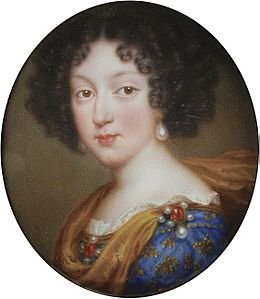
Marie Louise d'Orléans was born in Paris, France. Her birthplace was the Palais Royal. She was the oldest daughter of Philippe of France, Duke of Orléans. Her mother was Princess Henrietta of England.
As a granddaughter of a French king, she was called petite-fille de France. This title meant she was a "Granddaughter of France." She was also known as Mademoiselle d'Orléans.
Marie Louise was a charming and pretty child. She was her father's favorite. She had a happy childhood. She spent most of her time at the Palais Royal. She also stayed at the château de Saint-Cloud near Paris.
She spent a lot of time with her grandmothers. Anne of Austria loved her very much. Anne left most of her money to Marie Louise when she died in 1666. Her other grandmother, Henrietta Maria, lived in Colombes.
Marie Louise's mother died in 1670. The next year, her father married Elisabeth Charlotte of the Palatinate. Marie Louise always wrote kind letters to her stepmother.
Becoming Queen of Spain
An Arranged Marriage
In July 1679, Marie Louise learned important news. Her father and her uncle, King Louis XIV, told her about her marriage. She was to marry Charles II of Spain. Marie Louise was very upset by this news. She cried often because she was in love with her cousin, Louis.
Her marriage took place in two parts. First, a special ceremony called a proxy marriage happened. This was at the Palace of Fontainebleau on August 30, 1679. In a proxy marriage, someone stands in for the groom. For Marie Louise, her distant cousin, Louis Armand I, Prince of Conti, stood in for King Charles.
Many formal parties were held for the new Queen of Spain. These events lasted until mid-September. Before she left France, Marie Louise visited the Val-de-Grâce convent. Her mother's heart was kept there. Marie Louise would never return to France after this visit.
Life as Queen
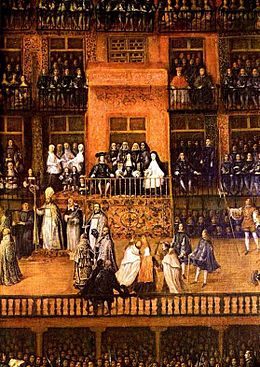
On November 19, 1679, Marie Louise married Charles in person. The wedding was in Quintanapalla, Spain. This marked the beginning of a lonely life at the Spanish court. Her new husband loved her deeply. He continued to love her for his whole life.
However, life at the Spanish court was very strict. There were many rules, called etiquette. For example, no one was allowed to touch the Queen. Also, Marie Louise and Charles could not have children. This caused her much sadness. Her closest friend was the French ambassador's wife, Marie Gigault de Bellefonds.
Marie Louise's new homes were different from the palaces in France. The Real Alcázar de Madrid was a strong, old palace. The Palacio del Buen Retiro was a country palace. At this palace, Marie Louise could keep her French horses. She also spent time at the Palacio Real de Aranjuez, south of Madrid.
After ten years of marriage, the couple still had no children.
The Queen's Final Days
In her last years, Marie Louise gained weight. She enjoyed sweet lemon and cinnamon drinks. These drinks needed a lot of sugar.
On February 11, 1689, she went horseback riding. Afterward, she felt a sharp pain in her stomach. This pain made her lie down for the rest of the evening. Doctors soon realized her condition was very serious. Priests were called to help her.
She died the next night.
After Her Death
Marie Louise's husband, King Charles, was heartbroken by her death. There were some rumors that she had been poisoned. However, it is now believed that the real cause of her death was appendicitis. This is a medical condition where a small organ in the belly gets infected.
See also
 In Spanish: María Luisa de Orleans para niños
In Spanish: María Luisa de Orleans para niños
|
Marie Louise of Orléans
Cadet branch of the House of Bourbon
Born: 26 April 1662 Died: 12 February 1689 |
||
| Royal titles | ||
|---|---|---|
| Vacant
Title last held by
Mariana of Austria |
Queen consort of Spain 1679–1689 |
Vacant
Title next held by
Maria Anna of Neuburg |


